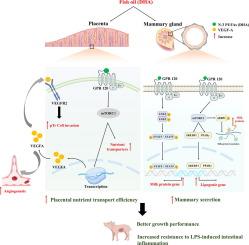当前位置:
X-MOL 学术
›
J. Adv. Res.
›
论文详情
Our official English website, www.x-mol.net, welcomes your
feedback! (Note: you will need to create a separate account there.)
Maternal fish oil supplementation enhances placental nutrient transport and mammary gland secretion via the GPR120 signaling pathway
Journal of Advanced Research ( IF 11.4 ) Pub Date : 2024-12-19 , DOI: 10.1016/j.jare.2024.12.029 Qihui Li, Qianzi Zhang, Senlin Su, Siwang Yang, Jiayuan Shao, Wutai Guan, Shihai Zhang
中文翻译:

母体鱼油补充剂通过 GPR120 信号通路增强胎盘营养物质运输和乳腺分泌
孕期补充母体鱼油 (FO) 已被证明可以改善妊娠结局。FO 被认为是 n-3 多不饱和脂肪酸 (n-3 PUFA) 的膳食来源。虽然早期研究集中在 n-3 多不饱和脂肪酸 n-3 多不饱和脂肪酸对胎儿神经发育、视网膜成熟和新生儿行为的益处,但它们在妊娠晚期胎盘和哺乳期乳腺中的作用仍不清楚。
在这里,我们旨在阐明母亲在怀孕和哺乳期间补充 FO 影响胎盘和乳腺功能的机制。
我们评估了 FO 对母体胎盘营养物质运输、乳腺乳汁合成和后代生长的影响。然后,我们通过体外实验探讨了二十二碳六烯酸 (DHA) 影响胎盘滋养层细胞功能和乳腺上皮细胞营养分泌的分子机制。最后,进行了一项脂多糖攻击实验,以了解母体补充 FO 在缓解后代肠道炎症方面的潜力。
孕晚期母体补充 FO 会增加后代出生体重,这与母体胎盘血管形成和营养转运蛋白丰度增强有关。此外,母体在哺乳期补充 FO 可改善乳腺分泌,增加初乳和成熟乳中的脂肪、蛋白质和非脂肪固体含量,从而促进后代生长。DHA 对胎盘滋养层细胞功能和乳腺上皮细胞营养分泌的刺激作用由 GPR120 信号通路介导。此外,母体补充 FO 可增强胎盘屏障,减少胎盘炎症、氧化应激并减轻脂多糖诱导的后代肠道炎症。
在 GPR120 介导的妊娠晚期和哺乳期,母体补充 FO 通过增加胎盘营养运输和乳腺分泌功能来促进后代生长。此外,母体补充 FO 可降低后代对肠道炎症的易感性。
更新日期:2024-12-19
Journal of Advanced Research ( IF 11.4 ) Pub Date : 2024-12-19 , DOI: 10.1016/j.jare.2024.12.029 Qihui Li, Qianzi Zhang, Senlin Su, Siwang Yang, Jiayuan Shao, Wutai Guan, Shihai Zhang

|
Introduction
Maternal fish oil (FO) supplementation during pregnancy has been shown to improve pregnancy outcomes. FO is recognized as dietary source for n-3 polyunsaturated fatty acids (n-3 PUFAs). While early research has focused on the benefits of n-3 polyunsaturated fatty acids n-3 PUFAs for fetal neurodevelopment, retinal maturation and neonatal behavior, their roles in the placenta during late pregnancy and in the mammary gland during lactation still remain unknow.Objectives
Here, we aim to clarify the mechanisms by which maternal supplementation with FO during pregnancy and lactation affects placental and mammary gland function.Methods
We evaluated the effects of FO on maternal placental nutrient transport, mammary gland milk synthesis and offspring growth. We then explored the molecular mechanisms by which docosahexaenoic acid (DHA) affects the function of placental trophoblast cells and nutrient secretion of mammary epithelial cells through in vitro experiments. Finally, a lipopolysaccharide-challenged experiment was performed to access the potential of maternal FO supplementation in alleviating offspring intestinal inflammation.Results
Maternal supplementation with FO during late pregnancy increased offspring birth weight, associated with enhanced maternal placental vascularization and nutrient transporter abundance. Additionally, maternal FO supplementation during lactation improved mammary gland secretion, increasing the fat, protein, and non-fat solids content in both colostrum and mature milk, thereby promoting offspring growth. The stimulatory effects of DHA on placental trophoblast cell function and nutrient secretion in mammary gland epithelial cells were mediated by GPR120 signaling pathways. Furthermore, maternal FO supplementation strengthened the placental barrier, reduced placental inflammation, oxidative stress and alleviated lipopolysaccharide-induced intestinal inflammation in offspring.Conclusion
Maternal FO supplementation during late pregnancy and lactation enhances offspring growth by increasing placental nutrient transport and mammary gland secretion function, mediated by GPR120. Additionally, maternal FO supplementation reduces the susceptibility of offspring to intestinal inflammation.中文翻译:

母体鱼油补充剂通过 GPR120 信号通路增强胎盘营养物质运输和乳腺分泌
介绍
孕期补充母体鱼油 (FO) 已被证明可以改善妊娠结局。FO 被认为是 n-3 多不饱和脂肪酸 (n-3 PUFA) 的膳食来源。虽然早期研究集中在 n-3 多不饱和脂肪酸 n-3 多不饱和脂肪酸对胎儿神经发育、视网膜成熟和新生儿行为的益处,但它们在妊娠晚期胎盘和哺乳期乳腺中的作用仍不清楚。
目标
在这里,我们旨在阐明母亲在怀孕和哺乳期间补充 FO 影响胎盘和乳腺功能的机制。
方法
我们评估了 FO 对母体胎盘营养物质运输、乳腺乳汁合成和后代生长的影响。然后,我们通过体外实验探讨了二十二碳六烯酸 (DHA) 影响胎盘滋养层细胞功能和乳腺上皮细胞营养分泌的分子机制。最后,进行了一项脂多糖攻击实验,以了解母体补充 FO 在缓解后代肠道炎症方面的潜力。
结果
孕晚期母体补充 FO 会增加后代出生体重,这与母体胎盘血管形成和营养转运蛋白丰度增强有关。此外,母体在哺乳期补充 FO 可改善乳腺分泌,增加初乳和成熟乳中的脂肪、蛋白质和非脂肪固体含量,从而促进后代生长。DHA 对胎盘滋养层细胞功能和乳腺上皮细胞营养分泌的刺激作用由 GPR120 信号通路介导。此外,母体补充 FO 可增强胎盘屏障,减少胎盘炎症、氧化应激并减轻脂多糖诱导的后代肠道炎症。
结论
在 GPR120 介导的妊娠晚期和哺乳期,母体补充 FO 通过增加胎盘营养运输和乳腺分泌功能来促进后代生长。此外,母体补充 FO 可降低后代对肠道炎症的易感性。






























 京公网安备 11010802027423号
京公网安备 11010802027423号